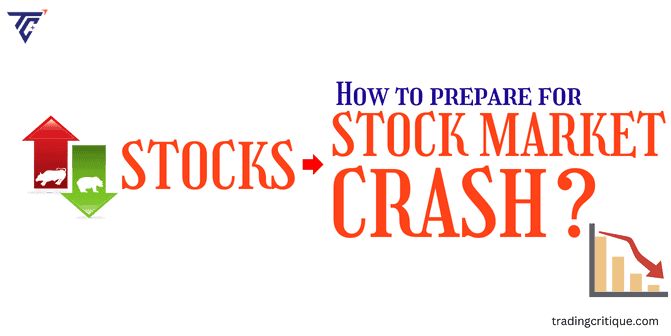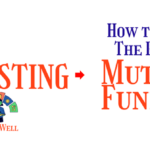Investing for the long term can give you more profit by investing in good timing. The stock market’s ups and downs are a normal part of investing, but a crash can be scary. Learn how to protect yourself from a stock market crash and protect your investments.
Quick Insights
What is a stock market crash?
A stock market crash is when stock prices suddenly drop significantly, causing people to lose a substantial portion of their invested money.
It happens because of fear and panic selling, often triggered by economic worries or overly high stock prices. While crashes are infrequent, they can occur rapidly, affecting investors unexpectedly.
History of stock market crash
A crash is when stock prices suddenly drop fast, usually because of fear caused by bad news. As a result long-term investors worried, so they sold stocks, making prices fall even more. This fear can make people sell fast, but it might not last.
Here are some important ones from the past:
- 1929: This was a significant economic downturn that led to the Great Depression. People were worried about the economy, so they sold their stocks, causing prices to fall sharply.
- 1987: On Black Monday, stock prices dropped by 25% due to investor panic and computer trading errors. But, within two years, the market recovered. To prevent future crashes, the government implemented rules to slow down trading during chaotic times.
- 2000: During the late 1990s, people were excited about internet companies, but then the bubble burst. Stock prices of these companies plummeted, and it took a long time for them to recover.
- 2008: When the housing bubble burst and the subprime mortgage crisis hit, the S&P 500, a big stock market index, lost almost half of its value. It took two years for things to get better.
- 2020: In February 2020, when COVID-19 started spreading everywhere, the market dropped by more than 30% in just over a month. But by August 2020, it had already bounced back, taking six months to get back to normal.
How to prepare for a stock market crash?
By studying history itself, you can learn why crashes happen and see how unpredictable the stock market can be. So, what to do when the stock market crashes.
Here are the simple steps to follow for market crash.
Know your investments
- How to survive a stock market crash? Don’t rush to sell just because the market is down.
- Review your original research notes to understand why you invested.
- Your research notes act like a roadmap, reminding you of your investment reasons.
- Having a plan can prevent impulsive decisions and provide clear reasons for selling if needed.
- Consider your risk tolerance before investing and use past reactions to guide future decisions.
Diversify your investment portfolio
- When the market goes down, it’s better if your money is in different types of investments, like stocks, real estate, and index funds.
- This helps reduce the risk of losing money when one investment does badly.
- If individual stocks or industries aren’t doing well, your other investments can help balance things out.
- If you’ve already diversified through retirement funds or robo-advisors, stick to your plan during a market decline.
Think about buying when prices are low
- When the market goes down, it could be a chance to buy stocks for less. But only do this if you have extra money to spare, and if you’re in it for the long-term potential.
- Be prepared with funds for emergency funds, retirement, and buying opportunities.
- Dollar-cost averaging involves investing a fixed amount of money at regular intervals, regardless of market conditions. This strategy helps smooth out the impact of market volatility on your investments.
- By consistently investing over time, you’re likely to buy more shares when prices are low and fewer shares when prices are high, ultimately lowering your average cost per share.
Look for dividends
- Dividend-paying stocks can provide a source of income during market downturns.
- Companies that pay dividends tend to be more stable and mature, making them attractive investments during turbulent times.
- While dividends are not guaranteed and can fluctuate, investing in dividend-paying stocks can provide some cushion against falling share prices.
Consider sector rotation
- Moving your money between different parts of the stock market is a classic way to handle market ups and downs, also known as the timing the market.
- When some industries are booming, you invest in them. When others are struggling, you switch to more stable ones.
- But not everyone likes this method, saying it’s tricky to time the moves right.
- Instead, some experts suggest putting your money into diversified index funds.
- These funds spread your investment across many areas of the market, so you’re covered if some do poorly. It’s like having a safety net for your money.
Think about bonds
- Bonds are debt securities issued by governments or corporations.
- Government bonds, particularly those issued by stable governments, are considered safer investments than stocks.
- During market crashes, investors often flock to bonds as a haven, driving up their prices and lowering their yields.
- While bonds typically offer lower returns than stocks, they provide stability and income, which can help offset losses in a stock-heavy portfolio.
Cut your losses wisely
- Sometimes, it’s necessary to sell losing investments to minimize losses and redeploy capital more effectively.
- This strategy is known as tax-loss harvesting and can have tax benefits if executed properly.
- However, it’s essential to avoid triggering a “wash sale,” which occurs when you sell a security at a loss and repurchase the same or a substantially identical security within 30 days. This can nullify the tax benefits of the sale.
Get advice from someone else
- Investing can be hard, especially when things aren’t going well.
- It’s okay to ask for help if you’re unsure about your investments.
- A financial advisor can give you advice and help you make smart choices.
Keep your focus on long-term goals
- When the market drops, you might feel like selling to avoid losing money. But if you’re thinking long-term, it’s often best to stay put.
- Selling when prices are low means you’ll lock in your losses. For instance, during the COVID-19 crash in February 2020, selling would have meant losing money. But if you held onto your investments, you would’ve recovered by August.
- Trying to jump back into the market later could cost you more and make you miss out on potential profits.
Make smart moves for the future
- Use market downturns as opportunities for smart financial moves.
- Consider converting traditional IRAs to Roth IRAs during low market periods.
- Seek advice from a tax professional to determine the suitability of Roth conversions for your situation.
How to protect yourself from a stock market crash?
When the stock market suddenly drops a lot, it’s called a crash. It happens to every investor at some point. Here are some simple ways to protect your money when this happens:
- Treasury bonds: These are like loans to the government. They’re very safe because the government pays them back. You get regular payments and your money back at the end.
- Corporate bond funds: These are similar to Treasury bonds, but instead of lending to the government, you lend to companies. They’re a bit riskier but still pretty safe.
- Money market mutual funds: These are super safe, but they don’t make much money right now.
- Gold bullion: Gold usually goes up when the stock market goes down. But don’t put all your money in gold.
- Real estate investment trusts (REITs): These let you invest in real estate without buying property. They can be safer during a crash.
- Dividend stocks: These are stocks of companies that pay you money regularly. They can be safer than other stocks, but they’re still risky.
- Essential sector stocks and funds: These are stocks in things like healthcare, food, and utilities. They’re safer during a crash because people always need these things.
- Total market index funds: These are funds that let you invest in lots of different stocks at once. Even during a crash, it’s good to keep investing in these.
Conclusion
When the stock market suddenly drops, it can be scary but it is just a short-term fluctuation. So it’s essential to stick to your long-term plan and not make rash decisions.
Focus on the basics of your investing strategies, spread your money across different types, and look for chances to buy when prices are low.
If you’re unsure, ask an expert for help. The key is to stay calm and steady during ups and downs because that’s what leads to success in the long run.
Pro Tip
To further enhance your trading success, consider our trusted Forex brokers. Stay informed about CFDs, forex, stocks, and cryptocurrencies, and make use of authentic broker reviews to make knowledgeable trading decisions. This comprehensive approach will help you navigate through market volatility effectively.




